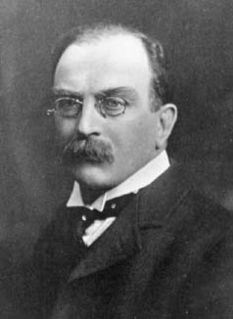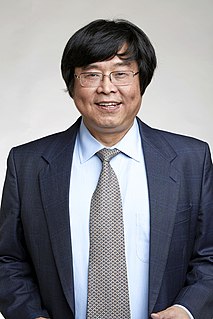
Fellowship of the Royal Society is an award granted to individuals that the Royal Society of London judges to have made a 'substantial contribution to the improvement of natural knowledge, including mathematics, engineering science and medical science'.

Sir Joseph Larmor FRS FRSE DCL LLD was an Irish physicist and mathematician who made innovations in the understanding of electricity, dynamics, thermodynamics, and the electron theory of matter. His most influential work was Aether and Matter, a theoretical physics book published in 1900.

Dr Richard Laurence Millington Synge FRS FRSE FRIC FRSC MRIA was a British biochemist, and shared the 1952 Nobel Prize in Chemistry for the invention of partition chromatography with Archer Martin.

Sir John Macleod Ball is Sedleian Professor of Natural Philosophy at the University of Oxford. He was the President of the International Mathematical Union from 2003–06 and a Fellow of Queen's College, Oxford. He was educated at the University of Cambridge and Sussex University, and prior to taking up his Oxford post was a professor of mathematics at Heriot-Watt University in Edinburgh.
Anthony James Trewavas FRS FRSE is Emeritus Professor in the School of Biological Sciences of the University of Edinburgh best known for his research in the fields of plant physiology and molecular biology. His research investigates plant behaviour.

Christopher Michael Bishop is the Laboratory Director at Microsoft Research Cambridge, Professor of Computer Science at the University of Edinburgh and a Fellow of Darwin College, Cambridge.
John Francis Toland FRS FRSE is an Irish mathematician based in the UK. From 2011 to 2016 he served as Director of the Isaac Newton Institute for Mathematical Sciences and N M Rothschild & Sons Professor of Mathematical Sciences at the University of Cambridge.
Sir John Stewart Savill, FRS, FMedSci is the Chief Executive of the Medical Research Council (MRC) in the UK and the Head of the College of Medicine and Veterinary Medicine and a Vice Principal of the University of Edinburgh.

Fellowship of the Royal Astronomical Society (FRAS) is a fellowship granted to individuals whose application is approved by the Royal Astronomical Society (RAS).

Dame Lesley Anne Glover, is a Scottish biologist and academic. She was Professor of molecular biology and cell biology at the University of Aberdeen before being named Vice Principal for External Affairs and Dean for Europe. She served as Chief Scientific Adviser to the President of the European Commission from 2012 to 2014. In 2018 she joined the Principal's senior advisory team at the University of Strathclyde.

Sir Mark Jeremy Walport is an English medical scientist and was the Government Chief Scientific Adviser in the United Kingdom from 2013 to 2017.
Prof Ian Naismith Sneddon FRS FRSE FIMA OBE was a Scottish mathematician who worked on analysis and applied mathematics.

James Ritchie CBE PRSE was a Scottish naturalist and archaeologist, who was Professor of Natural History at the University of Edinburgh 1936–52 and President of the Royal Society of Edinburgh 1952-1958.

Wenfei Fan is a computer scientist and Professor of web data management at the University of Edinburgh. His research investigates database theory and database systems. He is also the director of the International Center on Big Data at Beihang University, and the director of the Huawei-Edinburgh Joint Lab for Distributed Data Management and Processing.

Iain William Mattaj FRS FRSE is a British scientist and Honorary Professor at Heidelberg University in Germany. In 2018, he stepped down from Director General of the European Molecular Biology Laboratory (EMBL), a position he has held since 2005. He is currently the Director of the Human Technopole.
Prof George Cunliffe McVittie FRSE FRAS OBE (1904-1988) was a British mathematician and cosmologist.
Paul Martin Sharp is Professor of Genetics at the University of Edinburgh, where he holds the Alan Robertson chair of genetics in the Institute of Evolutionary Biology.

Sir Harry Work Melville, was a British chemist, academic, and academic administrator, who specialised in polymer research. He spent his early career in academia as a lecturer and researcher, before moving into administration as a civil servant and university college head.

Tracy Palmer is a Professor of Microbiology in the Centre for Bacterial Cell Biology at Newcastle University in Tyne & Wear, England. She is known for her work on the twin-arginine translocation (Tat) pathway.



















